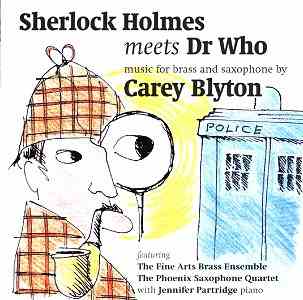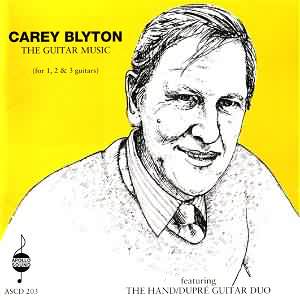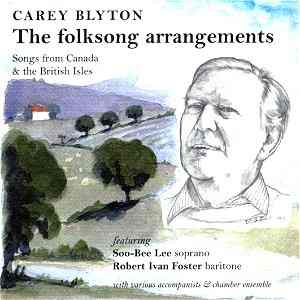CAREY BLYTON
Sherlock Holmes meets
Dr.Who. Music for brass
and saxophone. UPBEAT CLASSICS URCD148
featuring The Fine Arts Brass Ensemble
The Phoenix Saxophone Quartet with Jennifer Partridge piano
purchase

This is the fifth disc of Blyton's music to have emerged in the last eight
years on either the Upbeat label or on Apollo Sound distributed by Fand Music,
(the latter having advertised their Blyton discs quite extensively in the
last year) and very welcome it is too.
It is worth saying again that Carey Blyton is not a man to waste a good tune
(and he has written many of them) so there are pieces here which we have
met before on the other recordings in different arrangements. For example,
the Six Epigrams Op. 7, here arranged deliciously for alto sax and
piano, are found in their original form for solo piano on Apollo Sound (ASCD
204). The ubiquitous In Memoriam Scott Fitzgerald can also be heard
most beautifully in a version for solo guitar on Apollo Sound (ASCD 203).
Saxe Blue, here for tenor sax and piano is on 'The Return of Bulgy
Gogo' arranged for Saxophone Quartet (Upbeat URCD 106) and Mock Joplin
under its other name Piano Man for voice and piano on the 'The
Folksong Arrangements' (Upbeat URCD 131). With the exception of say Peter
Warlock (the original Bulgy Gogo) I can think of no other composer who so
readily and idiomatically arranges and re-arranges his own music. Yet this
CD offers a considerable amount more.
During the 1970s Carey Blyton was involved in the writing of incidental music
for the BBC's 'Dr.Who' series. Most composers would have allowed the music
to moulder forgotten on a shelf but not our Mr. Blyton. He has taken sections
of this music and arranged it into various suites for differing combinations
and I must say, having gone over the pieces on the piano with players as
well as heard them, they are entirely and brilliantly successful. It seems
incredible that they were published in 1993 (by AV Music) and yet the Examination
Boards either know nothing of them or have stoically ignored them. The teenage
brass players I have tried them with, all about Grade 5 standard, find them
nicely written, good fun and just the right level of 'coolness' for a school
concert.
The Vogan Suite, for Horn in F was originally scored for a weird combo'
including an Ophicleide! The Silurian Suite now for trumpet and piano
was originally and especially scored for medieval instruments, various clarinets,
horn, cello, piano and percussion. The Dalek Suite for Saxophone Quartet
was originally for this grouping plus various clarinet doublings. These original
scores can be heard on the Dr.Who videos which are available from BBC
Enterprises.
The other interesting work which helps to give this CD its title is A
Sherlock Holmes Suite for Brass Quintet. Especially fun here is the sixth
movement Professor Moriarty 'the Napoleon of Crime'.
Throughout, the performances are faultless and expressive. The composer,
who could not be at the recording sessions, must be overjoyed by the commitment
of the team involved and it is obvious how much the players must have enjoyed
these colourful scores. But I do advise that you do not listen to the CD
through at one sitting. What did St. Augustine say about too much pleasure
at once?
The 15-page CD booklet is wonderfully presented as ever, with this time,
a clearer track list. This is particularly important as there are 31 tracks,
many quite short. The extensive notes are again by the enigmatic Mary Q.
Palimpsest.
CAREY BLYTON THE GUITAR MUSIC:
Bach-Chat / In memoriam Scott Fitzgerald / In memoriam Django
Reinhardt / Saxe Blue / The Oceans of the Moon all for
guitar duo. Patterns / Pantomime, 2 Japanese Pieces
/ Pastiches / For the Delight of Shiva / The Bream for
guitar solo Yugen for 3 guitars The Hand/DUPRÉ Guitar
Duo Apollo Sound ASCD 203

If you had a musical time machine and could choose some exciting and historic
event from the past, where would you travel? What about the 1st
performance of the St. Matthew Passion? Or, that extraordinary concert
in 1808 when the 1st performances of Beethoven's 5th
and 6th symphonies as well as the Choral Fantasia took
place? Well, I would add to those events, an all-night party in downtown
Beckenham, circa 1951, when Carey Blyton would improvise for hours, producing
the initial ideas for some of the gorgeous pieces found on this CD, and on
"The Return of Bulgy Gogo", music for Saxophone Quartet. (Upbeat URCD106)
Then a teenager, and by no means certain of a musical career, Blyton already
had an uncanny knack of evoking a past era, here the 1920s and '30s, reflecting
on the age of early Jazz. Little did he know but that a real vogue for the
period was to start in the 1970s. At first he did not write his melodies
down, but had them recorded privately on shellac! Some of these tunes can
be heard in the guitar transcriptions made in the early '70s, when nostalgia
was at its height. These include the delicious In Memoriam Scott
Fitzgerald Op. 60 and the delectable In Memoriam Django Reinhardt
Op. 64. Carey Blyton's skill is to create a perfect cradle for his ideas
in whatever medium he chooses. The above pieces can also be found on the
"Bulgy Gogo" disc, arranged idiomatically for saxophone quartet. The tripartite
Patterns was originally published as piano pieces in 1961, but it
appears arranged for saxes, and here for guitar duo, sounding as if it was
originally conceived for those instruments. Blyton has had what the excellent
booklet describes as "a love affair with the guitar for almost 30 years".
It is a difficult instrument to write for, and many better known composers
have struggled with it. However we have here works for solo guitar (divided
happily between Richard Hand and Tom Dupré), guitar duet
(Pantomime - also on the Saxophone disc) and guitar trio
(Pastiches - an arrangement by Keigo Fujii).
But behind these gentle pastiche works, where is the real Blyton? Only rarely
can we find him, but in The Bream Op. 51 there he is. It was written
for Julian Bream who has never performed it! Why ever not? It is gratefully
written and is original in its gentle evocation of a mystic almost eastern
sound-world. Blyton has, in fact, a strong interest in the far east. I have
never understood the neglect of his only opera The Girl from Nogami
commissioned by the Guildhall School of Music where he was Visiting Professor
of Composition for 11 years. On this CD we have Two Japanese Pieces
Op. 68, Yugen Op. 80 both for solo guitar, and the longest single
movement on the disc For the delight of Shiva Op. 94 (1986). Here
the composer experiments in "the spirit of the Raga" with "lateral vibrato"
and with the re-tuning of the A-string. In these pieces you can see him growing
in confidence as he develops this exotic language. It is to these pieces
that I have most often returned because of their unique atmosphere, so
imaginatively set for the instrument.
The accompanying booklet is generally a model of its kind. All composers
should note its clear format and balanced musical analysis. The only snag
initially is that the track numbers are only given on the back of the CD
case and not in the booklet. There is an excellent biographical note (not
many composers can claim that they worked as research assistant for the Gas
Council whilst studying music privately). All publishers are carefully listed
at the back of the booklet. Perhaps the BBC may take a moment to pay this
disc a little interest. Isn't it about time that Carey Blyton's music was
taken seriously by Radio 3? It is a disgraceful situation, and this CD as
well as Bulgy Gogo would be ideal for a programme or two, and would
fit nicely into "On Air" or the Rush Hour programmes. I strongly recommend
this disc.
CAREY BLYTON Miniatures: The Return
of Bulgy Gogo Music for Saxophone Quartet. Phoenix Saxophone Quartet
(65 mins) UPBEAT URCD 106
purchase

This CD is great fun for all the family! The longest piece is Dance Variations
(1975) which occupies 11 tracks in 11 minutes. Each variation is a pastiche:
Foxtrot, Rhumba, Rag etc. each, so perfectly characterised. As often with
Blyton the music started as background to a film, this one promoted by British
Aerosol.
Blyton has written music for commercials TV throughout his life, including
scores for Dr. Who in the late 60s. He has written a great deal of educational
music including pieces for school choral groups. His three Victorian melodramas
or Unholy Trinity of Cantatas, Sweeney Todd, Dracula and Frankenstein are
regularly performed. The finale of Dracula, 'Quincey's Rag' is here transcribed
for saxophone quartet. His Patterns, three pieces for children is also
transcribed.
Among other more serious pieces Birds Op 67, a theme and nine variations
written for RSPB and In Memoriam Django Reinhardt Op 64, a theme and two
variations which like other Blyton compositions extemporisation in "downtown
Beckenham" I imagine.
The performances seem perfect but the recording is possibly a little close.
Well worth the money if you want some good-hearted musical fun.
CAREY BLYTON The Piano Music (for
solo piano and piano duet) Richard Deering - Piano Solo. Cann Piano
Duet. Apollo Sound ASCD 204

This is the third disc to appear in the last five years of the music of Carey
Blyton and the second to appear on Heinz Herschmann's small but long established
Apollo Sound label. It is a very well filled disc: 45 tracks - 74 minutes.
Blyton is a miniaturist, deliberately so. The idea of adding say another
string quartet or Piano Concerto to the great cannon of classical works has
no appeal to him. The delicate water colour which wastes no space and paint
is his concern.
He has never tried to exceed his interests or abilities, and unlike some
composers who are naturally miniaturists but who think that they shouldn't
be, Blyton is content to be himself. Even so there is a rich mix of styles.
In the early '70s there began the discovery of Scott Joplin mainly due the
film The Sting, and although as a third year music student I rather
arrogantly considered myself to be "well listened", I had never heard Joplin's
music. Carey was then 'Visiting Professor of Composition for Films, Television
and Radio' at the Guildhall School of Music and he knew all about Joplin
and Ragtime. His life-long interest can be heard in some of the earlier music
recorded here, written before the age of nostalgia. These include Blues in
the Six Epigrams Op. 7 (1951) and Park Lane Stroll (c.1952).
The music dates from as early as 1949 when he was 17 to 1991 when he ...
wasn't! The Opus 1 Five Diversions are particularly interesting. It
is a brave composer who allows his Op. l to be committed to disc. In my own
copy of the music the composer has written "Moral ... Never throw anything
away" and what a good job that he didn't, because these are charming and
fascinating pieces, good to play and interesting to hear. Typical of the
composer, mock pastiche, gently witty with attractive melody, wistful harmony
and a touch of bi-tonality, not unlike Satie and Lord Berners.
Carey Blyton is not a man to waste a good idea, using every note of inspiration
we find here pieces which we have met before, either on "The Return of Bulgy
Gogo" (Upbeat URCD 106) or on the Guitar Music (Apollo Sound 203) for instance
A ghost from the Past actually makes an appearance on both discs as
In Memoriam Scott Fitzgerald Op 60. I remember, a few years ago conducting
a version of The Indian Coffee House Roof Garden Orchestra Tango Op.
91 in an incarnation for school wind instrumentalists. Here it is now, in
its original version, for piano duet.
In addition this recording represents the composer's interest in the very
young musician in Fun with Figures Op. 41, twelve tiny pieces which
cleverly use and develop each of the available intervals, and the Three
Musical Mishaps Op. 32 (also transcribed elsewhere for other instruments)
with such titles as The Damaged Bagpipes and The Broken Pianola.
Incidentally Blyton's titles are always fun, a particularly good one here
and a most successful piece for piano duet is Eine Kleine Froschmusik
(A Little Frog-Music).
The performances and recording are exemplary and the booklet as with the
other two discs is (at 18 pages) very informative. The sleeve notes having
been written by one Mary Q. Palimpsest! Having done some brass rubbing I
seem to recall that a palimpsest brass is one where the original is disguised
on the reverse. Very interesting.
CAREY BLYTON A Newfoundland Posy
Op. 72 for Violin, Clarinet and piano; Six Regional Canadian Folk
Songs Op. 39 arr. for Voice & Piano; Three Canadian Folk Songs
Op. 44 arr for Voice, Clarinet and Piano; Three Welsh Folk Songs Op.
36 arr for Voice and Harp; The Maiden Deceived - a British Folk Song
Cycle Op 84 for Voice, Clarinet, Horn, and Piano. four original songs in
various 'folk' idioms. Soo-Bee Lee (oprano) Robert Ivan Foster
Baritone Upbeat URCD 131

This is now the fourth Blyton CD since 1991: "The Return of Bulgy Gogo" (Upbeat
URCD 106); Guitar Music (Apollo Sound ASCD 203); Piano Music (Apollo Sound
ASCD 204). This disc is in many senses the most typical, the most frustrating
and the most eccentric of all. Blyton, as has been said before, is a miniaturist.
The question is, has this gentle and unprepossessing music been able to make
an impact. The answer is generally "yes".
I say 'generally' because the composer has made a brave decision to have
transferred onto this new disc the voice of Robert Ivan Foster (accompanied
by Nina Walker piano and later by Tryphena Partridge harp) the fine Canadian
baritone, in recordings made on 12" LPs in the 1960s. He sings the Op 39
songs the Opus 44 and Op 36. All of these cycles are dedicated to Foster
who obviously had a great deal of affection for them and sings them with
earnest conviction. The recorded sound is not really a problem (although
there is a little distortion on an occasional high note) it is for me the
rather operatic quality of the voice which I find too heavy and ponderous
for such pieces as Auction Block or the Cherry Tree Carol.
I can however quite see why the composer did not want these recordings to
be lost in some cavernous archive and forgotten, and there is certainly subtlety
in the voice when required.
The disc opens with purely instrumental settings of folk melodies for Violin,
Clarinet and piano especially commissioned for this instrumentation by the
Centre Group of St John's Newfoundland. The performers are David Campbell,
Clarinet, John Truster, violin and Raphael Terroni, piano. These are delicate,
at times almost Ravelian arrangements using differing combinations of the
Trio. I was particularly taken with The blooming bright star of Belle
Isle for solo piano, not only for its delicious harmonies but also for
its careful use of the strings inside the piano. The Finale is an Hungarian
czardas which reminded me of Dracula, Blyton's ever-popular School
Cantata. The rest of the songs are recorded by Soo-Bee-Lee accompanied by
Raphael Terroni especially for this CD. I saw her recently in the Cosi
Fan Tutte at the Bath Festival and liked her light high head voice. She
employs it here and is sweet-toned and quite convincing.
I must admit to having known Blue Christmas and Robin Redbreast
for some years having done them with children's voices, so hearing a
sophisticated soprano sing these tunes came as a surprise. Robin
Redbreast has a canonic second verse in three parts with the piano taking
the middle entry and most effective it can be too. That canon does not happen
here and I felt that a simple touch of double tracking might have added even
more to this delightful song.
The highlight of the disc is British Folk Song Cycle The Maiden
Deceived. Many less imaginative composers would have taken these melodies
one after the other and set them in a through-composed cycle moving from
one contrasted mood to the next, but not Blyton. I love the way that Early
One Morning reappears in the second movement having opened the first
and the way the setting of O Waly Waly seems to have been composed
without knowing that Britten's ever existed, Blyton's is individual and haunting
in a completely different way. And what do you do with There is a tavern
in the town? Well, why not set it in the style of a Beethoven folk song
arrangement with all that Germanic robust earnestness. It ends the CD in
a typical Blytonesque way - as a pastiche of someone or something else and
yet totally and convincingly only Carey Blyton. The booklet is clearly and
generously annotated with translations of the Welsh Songs. Both singers'
diction is very clear and no text is needed for them. There are some inaccuracies
in track numbering between booklet and case insert. Some more Blyton CDs
will be out in the not too distant future.
Reviewer
Gary Higginson
